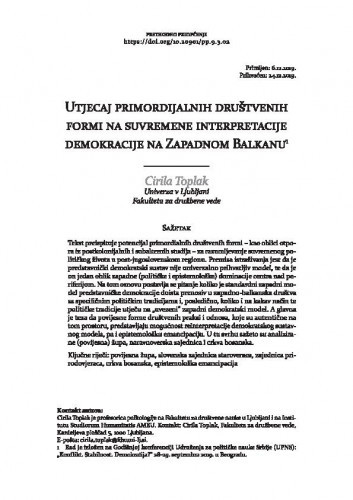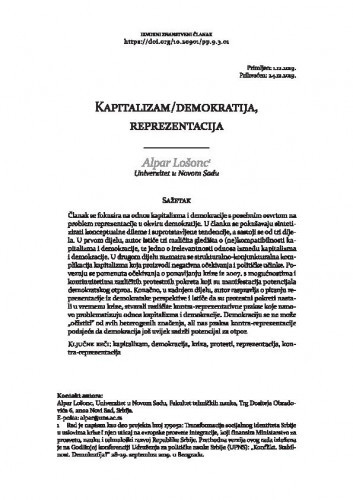Tekst preispituje potencijal primordialnih društvenih formi – kao oblici otpora iz postkolonijalnih i subalternih studija – za razumijevanje suvremenog političkog života u post-jugoslovenskom regionu. Premisa istraživanja jest da je predstavnički demokratski sustav nije univerzalno prihvatljiv model, te da je on jedan oblik zapadne (političke i epistemološke) dominacije centra nad periferijom. Na tom osnovu postavlja se pitanje koliko je standardni zapadni model predstavničke demokracije doista prenosiv u zapadno-balkanska društva sa specifičnim političkim tradicijama i, posledično, koliko i na kakav način te političke tradicije utječu na „uvezeni“ zapadni demokratski model. A glavna je teza da povijesne forme društvenih praksi i odnosa, koje su autentične na tom prostoru, predstavljaju mogućnost reinterpretacije demokratskog sustavnog modela, pa i epistemološku emancipaciju. U tu svrhu sažeto su analizirane (povijesna) župa, naravnoverska zajednica i crkva bosanska.; The author examines the democratic potential of primordial social forms - as forms of resistance from postcolonial and subaltern studies - to understand contemporary political life in the post-Yugoslav region. The premise of the research is that the representative democratic system is not a universally acceptable model, and that it is a form of Western (political and epistemological) domination of the center over the periphery. Following this premise, the author asks whether, and to what extent is the standard Western model of representative democracy transferable to Western Balkan societies with their own specific political traditions and, consequently, to what extent these political traditions affect the "imported" Western democratic model. The main thesis of the article is that the historical forms of social practices and relationships that are authentic to this area represent the possibility of reinterpretation of the democratic model, including the opportunity of epistemological emancipation. For this purpose, the (historical) parish, the community of natural faith in Slovenia and the Bosnian church are analysed as primordial forms in the Western Balkans.
Sažetak

 Političke perspektive : časopis za istraživanje politike : 9, 3 (2019) / glavna urednica Ana Matan.
Političke perspektive : časopis za istraživanje politike : 9, 3 (2019) / glavna urednica Ana Matan.